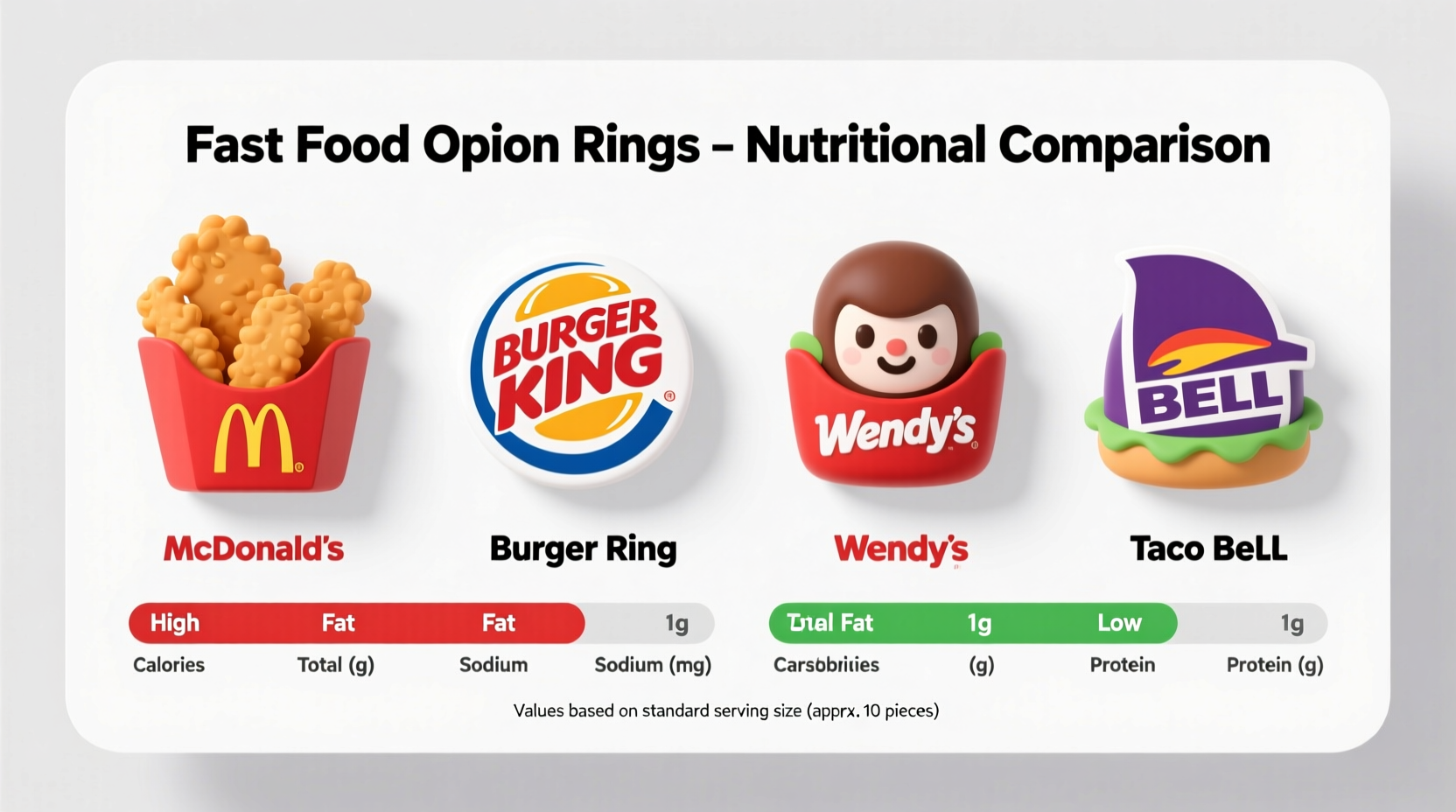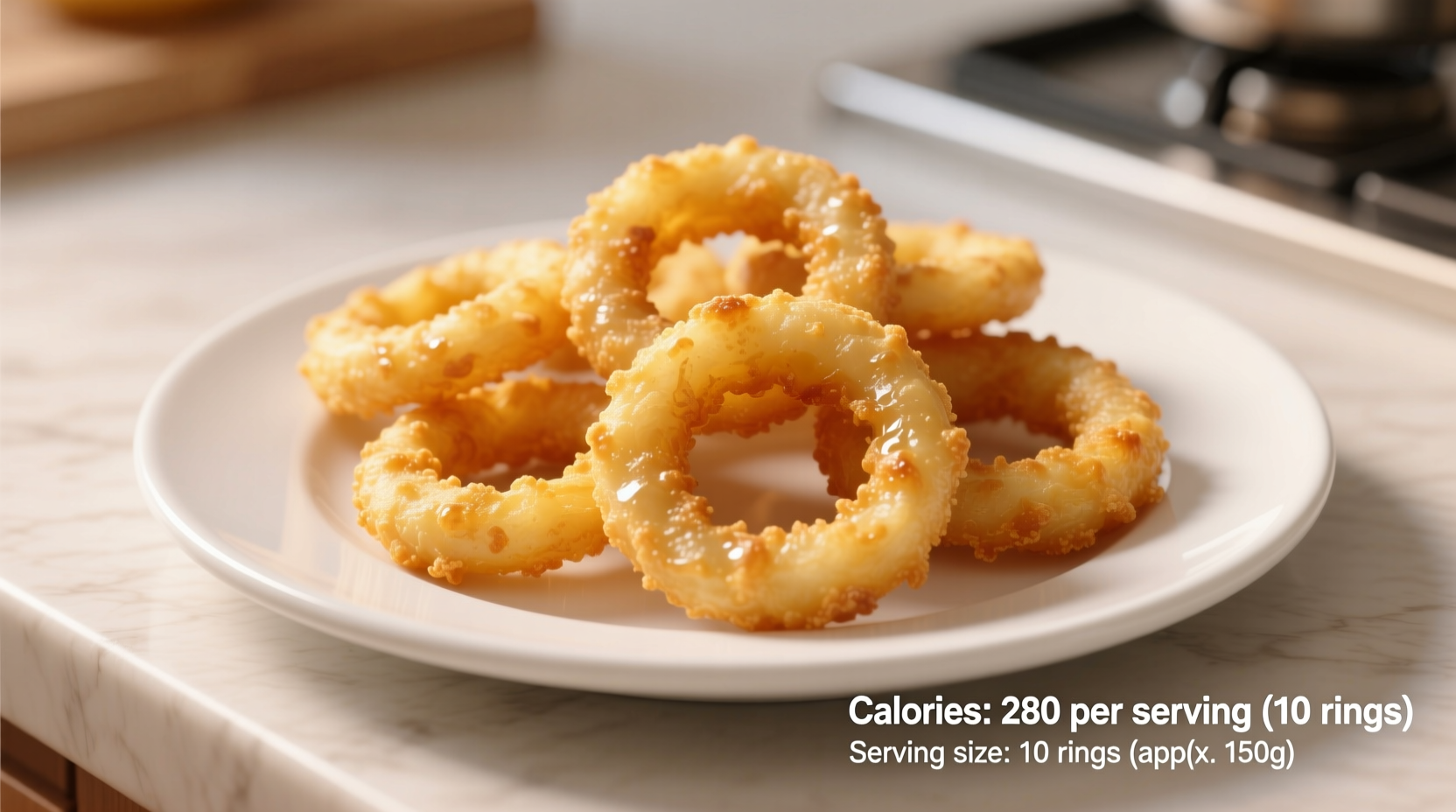When you're tracking your daily intake or making informed fast food choices, knowing the exact nutritional profile of popular menu items matters. If you've ever wondered how many calories are in BK onion rings while deciding what to order, you're not alone. Millions of consumers check fast food nutrition facts before making menu selections.
What Exactly Are You Eating? BK Onion Rings Breakdown
Burger King's onion rings consist of battered and fried onion slices, delivering that satisfying crunch many crave. The standard serving size (approximately 3.5 oz or 99g) contains:
| Nutrient | Amount per Serving | % Daily Value* |
|---|---|---|
| Calories | 410 | 20% |
| Total Fat | 22g | 28% |
| Saturated Fat | 4g | 20% |
| Trans Fat | 0.5g | - |
| Sodium | 640mg | 28% |
| Total Carbohydrates | 50g | 18% |
| Dietary Fiber | 3g | 11% |
| Sugars | 4g | - |
| Protein | 5g | - |
*Percent Daily Values are based on a 2,000 calorie diet. Your daily values may be higher or lower depending on your calorie needs.
How BK Onion Rings Fit Into Your Daily Nutrition Goals
Understanding where burger king onion rings calories fit within your overall diet is crucial for making informed choices. For someone following a standard 2,000-calorie diet:
- The 410 calories represent approximately 20% of your daily intake
- The 640mg of sodium accounts for nearly 28% of the recommended daily maximum (2,300mg)
- With 22g of total fat, you're consuming over a quarter of your recommended daily fat intake
According to the Dietary Guidelines for Americans 2020-2025, discretionary calories from foods like fried snacks should be limited. The guidelines recommend keeping saturated fat below 10% of daily calories and sodium under 2,300mg for adults.
Comparing Fast Food Side Options: Calorie Conscious Choices
When evaluating burger king onion rings vs fries calories, the differences might surprise you. Here's how BK's offering compares to similar items at major fast food chains:
| Fast Food Chain | Side Item | Calories | Total Fat (g) | Sodium (mg) |
|---|---|---|---|---|
| Burger King | Onion Rings (regular) | 410 | 22 | 640 |
| Burger King | French Fries (medium) | 380 | 17 | 290 |
| McDonald's | Onion Rings (medium) | 430 | 21 | 630 |
| Wendy's | Onion Rings (medium) | 490 | 25 | 810 |
| Taco Bell | French Fries (regular) | 330 | 15 | 390 |
This comparison shows that while BK's onion rings aren't the highest calorie option among major chains, they do contain significantly more sodium than their french fries alternative. When tracking onion rings calorie count for diet tracking, these differences matter.
Practical Tips for Making Smarter Fast Food Choices
If you're watching your calorie intake but still want to enjoy fast food occasionally, consider these practical strategies:
- Share portions - Split a serving of onion rings with a friend to cut calories in half
- Check for seasonal variations - Some locations offer smaller portion sizes during limited-time promotions
- Balance your meal - Pair higher-calorie sides with grilled protein options rather than fried items
- Ask about preparation - Some locations may offer air-fried alternatives upon request

Healthier Alternatives at Burger King
If you're specifically looking for lower-calorie side options at Burger King, consider these alternatives to the standard onion rings:
- Apple Slices (15 calories) - A refreshing, low-calorie option with natural sweetness
- Garden Side Salad (15 calories without dressing) - Provides vegetables with minimal calories
- Whopper Jr. without mayo - Sometimes a small burger with strategic modifications can be comparable in calories while providing more protein
According to the FDA's nutrition labeling guidelines, all major fast food chains must provide accurate nutritional information, making it easier to compare options across restaurants.
Understanding Fast Food Nutrition Evolution
Fast food nutrition has evolved significantly over the past two decades. In the early 2000s, many chains didn't provide detailed nutritional information, and trans fats were more prevalent. The CDC's data on obesity trends shows increasing awareness of nutrition has led to menu modifications across the industry.
Burger King specifically has made efforts to reduce trans fats and provide more transparent nutrition information since the mid-2010s. While the core bk onion rings nutrition facts haven't changed dramatically recently, the availability of this information represents progress in consumer transparency.
When Are BK Onion Rings a Reasonable Choice?
Occasional fast food consumption can fit within a balanced diet. BK onion rings might be appropriate when:
- You're following a higher-calorie diet for athletic performance
- You're treating yourself occasionally as part of a balanced eating pattern
- You're pairing them with nutrient-dense main courses and vegetables
- You're adjusting other meals that day to accommodate the higher calorie side
Registered dietitians generally recommend viewing items like onion rings as occasional treats rather than regular menu choices due to their high calorie density and relatively low nutritional value compared to vegetable-based sides.











 浙公网安备
33010002000092号
浙公网安备
33010002000092号 浙B2-20120091-4
浙B2-20120091-4